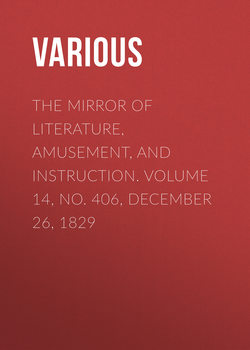Читать книгу The Mirror of Literature, Amusement, and Instruction. Volume 14, No. 406, December 26, 1829 - Various - Страница 1
VIRGIL'S TOMB
ОглавлениеThis consecrated relic of genius stands on the hill of Posilipo, in the environs of Naples. Its recent state is so beautifully described by Eustace, that we shall not, like gipsys do stolen children, disfigure it to prevent recognition.
Proceeding westward along the Chiaia and keeping towards the beach, says Eustace, we came to the quarter called Mergyllina. To ascend the hill of Posilipo we turned to the right, and followed a street winding as a staircase up the steep, and terminating at a garden gate. Having entered, we pursued a path through a vineyard and descending a little, came to a small square building, flat-roofed, placed on a sort of platform on the brow of a precipice on one side, and on the other sheltered by a super-incumbent rock. An aged ilex, spreading from the sides of the rock, and bending over the edifice, covers the roof with its ever verdant foliage. Numberless shrubs spring around, and interwoven with ivy clothe the walls and hang in festoons over the precipice. The edifice before us was an ancient tomb—the tomb of VIRGIL! We entered; a vaulted cell and two modern windows alone presented themselves to view: the poet's name is the only ornament of the place. No sarcophagus, no urn, and even no inscription to feed the devotion of the classical pilgrim. The epitaph which though not genuine is yet ancient, was inscribed by the order of the Duke of Pescolangiano, then proprietor of the place, on a marble slab placed in the side of the rock opposite the entrance of the tomb, where it still remains. Every body is acquainted with it—
Mantua me genuit, Calabri rapuere, tenet nunc Parthenope, cecini
pascua, rura, duces.
But there are authors who venture to assert, that the tomb of which we are now speaking, is not the sepulchre of Virgil. Of this number are the classic Addison and the laborious and accurate Cluverius. The authority of two such eminent persons, without doubt, carries great weight with it, but that weight is upon this occasion considerably lessened by the weakness of the arguments on which their opinion is grounded. These arguments may be found in Cluverius, and Addison merely expresses his opinion without entering into any discussion. They are drawn from a few verses of Statius.
In opposition to these arguments, or rather conjectures founded upon the vague expressions of a single poet (a poet often censured for his obscurity), we have the constant and uninterrupted tradition of the country supported by the authority of a numerous host of learned and ingenious antiquaries; and upon such grounds we may still continue to cherish the conviction, that we have visited the tomb of Virgil, and hailed his sacred shade on the spot where his ashes long reposed.
The laurel which was once said to have sprung up at its base, and covered it with its luxuriant branches, now flourishes only in the verses of youthful bards, or in the descriptions of early travellers; myrtle, ivy and ilex, all plants equally agreeable to the genius of the place, and the subjects of the poet, now perform the office of the long-withered bays, and encircle the tomb with verdure and perfume.
The sepulchre of Virgil, it may be imagined, must have long remained an object of interest and veneration, especially as his works had excited universal admiration even in his life-time, and were very soon after his death put into the hands of children, and made a part of the rudiments of early education. Yet Martial declares that it had been neglected in his time, and that Silius Italicus alone restored its long forgotten honours.
The reader will learn with regret that Virgil's tomb, consecrated as it ought to be to genius and meditation, is sometimes converted into the retreat of assassins, or the lurking place of Sbirri. Such at least it was the last time we visited it, when wandering that way about sun-set we found it filled with armed men. We were surprised on both sides, and on ours not very agreeably at the unexpected rencounter; so lonely the place and so threatening the aspects of these strangers. Their manners however were courteous; and on inquiry we were informed that they were Sbirri, and then lying in wait for a murderer, who was supposed to make that spot his nightly asylum. It would be unjust to accuse the Neapolitans of culpable indifference towards this or any other monument of antiquity; but it is incumbent on the proprietor or the public, to secure them against such profanation. On the whole, few places are in themselves more picturesque, and from the recollection inseparably interwoven with it, no spot is more interesting than the tomb of Virgil.
